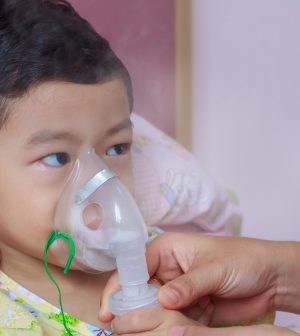- Could Your Grocery Store Meat Be Causing Recurring UTIs?
- Are You Making This Expensive Thermostat Error This Winter?
- Recognizing the Signs of Hypothyroidism
- 10 Strategies to Overcome Insomnia
- Could Artificial Sweeteners Be Aging the Brain Faster?
- Techniques for Soothing Your Nervous System
- Does the Water in Your House Smell Funny? Here’s Why
- Can a Daily Dose of Apple Cider Vinegar Actually Aid Weight Loss?
- 6 Health Beverages That Can Actually Spike Your Blood Sugar
- Treatment Options for Social Anxiety Disorder
1 in 4 Kids Hospitalized With COVID Have Symptoms Months Later

More than a quarter of kids hospitalized with COVID-19 or a complication called multisystem inflammatory syndrome (MIS-C) continue to have health problems more than two months later, a new study finds.
A follow-up of COVID cases from 25 hospitals found that 27% of children and teens hospitalized with acute infection and 30% of those with MIS-C had persistent symptoms, activity impairment or both two to four months later.
“The risks of severe illness and lingering complications are higher than the risk of complications from the vaccine, which are very rare,” said lead researcher Dr. Adrienne Randolph, of Boston Children’s Hospital.
For the new study, her team conducted followup surveys on 358 patients. They heard back from 279.
Of those, 40% were hospitalized with acute COVID and half of those were admitted to an intensive care unit, the surveys revealed. About 60% had MIS-C; 86% of those patients also required time in the ICU.
After two and four months, “almost three quarters were back to baseline, which is reassuring,” Randolph said in a hospital news release. “But unfortunately, more than one in four were not. Although this is much better than many reports in hospitalized older adults, it is still very worrisome.”
Of kids with lingering symptoms, the most common were:
- Fatigue or weakness, affecting 11% of those with COVID and 20% of those with MIS-C.
- Shortness of breath (9% and 3%, respectively).
- Cough (10% and 3%).
- Headache (8% for both groups).
- Muscle and body aches (5% and 3%).
- Fever (3% and less than 1%).
Activity impairment was more common after MIS-C (21%) than after COVID-19 (14%).
According to caregiver reports:
- 7% of kids in the COVID group and 14% of those who had MIS-C were unable to walk or exercise as much as before.
- 7% of the COVID group and 8% of the MIS-C patients were sleeping more than usual.
- About 4% in each group had difficulty getting schoolwork done or felt unable to focus.
Three factors predicted an increased risk for a long recovery:
- Involvement of more organs in patients with acute COVID-19.
- Underlying respiratory conditions (usually asthma) in MIS-C patients.
- Obesity in patients with MIS-C.
Researchers noted that the study was conducted before vaccines were available.
“Now that vaccines are available, I strongly recommend that children and adolescents get vaccinated,” Randolph said. “We know that patients can be re-infected even if they’ve had COVID-19, and we previously showed that vaccination can prevent MIS-C and severe COVID-19.”
The findings were published Aug. 12 in the journal Pediatrics.
More information
The U.S. Centers for Disease Control and Prevention has more about kids and COVID.
SOURCE: Boston Children’s Hospital, news release, Aug. 12, 2022
Source: HealthDay
Copyright © 2026 HealthDay. All rights reserved.










